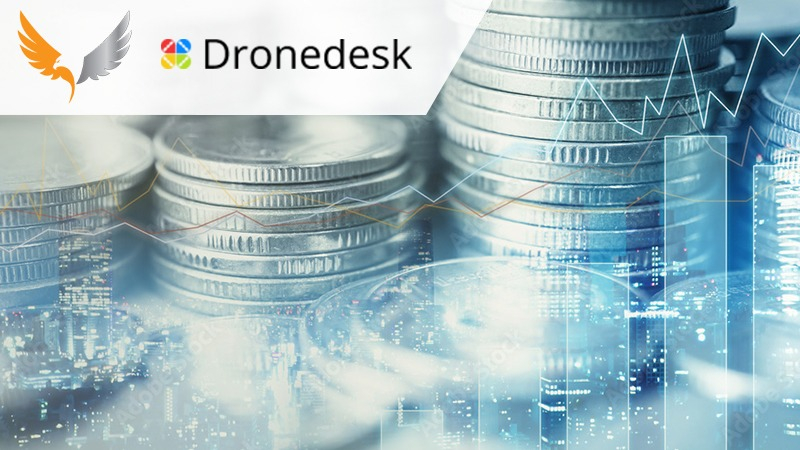Editorial Feature
Pricing your drone jobs
Words By: Dronedesk
One of the most common questions we get from new commercial drone operators is "How much should I charge my client for this [inspection/wedding/survey] job?". This post attempts to provide some guidance as to what you should be thinking about when answering that question for your own business.
As of March 2023, the number of commercial drone operators in the UK is just under 6,000. And it's growing steadily every month. Not all of them are active drone businesses; some are research institutions or police forces for example. Nonetheless, relative to the amount of work available, that's a large number of people and businesses that you'll be competing with as a commercial drone operator.
When you're starting out, it's really difficult to work out how much to charge and that's precisely because you're new and probably inexperienced in the field. It might be all too tempting to simply price low in order to win business and get your new drone business off the ground (see what I did there!). But that would be a huge mistake.

As tempting as it might be, pricing low will simply enter you into a race to the bottom with fellow operators. And, in a world of low-ball pricing, jobs will be rushed, safety will be compromised and there will be an inevitable erosion of the quality of the product. In the end, which can only be damaging to your reputation and to the commercial drone industry.
I implore you to think twice and, instead, apply some rigor to your pricing structure.
How to work out what you should charge
Like any business, you need to apply some basic accounting principles to your costing calculations. You need to accurately account for your cost of sales (including marketing), capital costs, target profit and, especially if you're a sole trader or one-man-band, your living costs.
Just to re-iterate, what you should not do is find out what your competitors are charging and simply undercut them. Likely, you're not going to be able to sustain that business model because your costs will quickly outweigh your income.
So, what do you need to consider?
Flyable days
You need to consider that you'll only be able to fly for so many days in any year. You will lose days to:
- Weather - it's a major factor, especially in the UK, and you're unlikely to be able to fly on every day of every week you're available
- Planning and admin days - although applications like Dronedesk can obviously help you reduce admin time substantially
- Days or weeks off for holiday and/or sickness
Conservatively, you might work on the assumption that you'll only have paid work 2.5 days a week in perhaps 40 weeks of the year. So that's just 100 days per year at a client's site doing visible, productive, paid work.
Setup costs
In the first year particularly, your costs may be substantial. You'll need to account for:
- The capital costs of your drone, controllers, cases
- The safety kit you'll need
- You’re training and CAA permissions application fee
- Your insurance
- Video/still editing software and controller software if buying outright
As a minimum you should assume perhaps £4k for all that.
Operating costs
You'll need to account for:
- Vehicles and their running costs - let's say you change your car/van every 3 years at cost to change of £8k - plus tax, insurance, maintenance, and fuel - total £3k/yr
- Marketing, website development and hosting - £1k/yr
- Office space, utility costs, rates etc. - £2.5k/yr
- Accounting costs, subscriptions, software licences and so on - let's say £500/yr
- And then there's insurance and drone maintenance etc. - let's say £1k/yr
That's a very conservative estimate of £8k/yr
So, you can see in total your set up and annual operating costs might easily be in the region of £12k in year one. That means, that just to cover your costs for each of your year one 100 days of work, you'd need to charge an absolute minimum of £120/day.
On top of that of course, you need to factor in your salary or, if you're a sole trader, your living costs. So, even if you only draw the UK median salary of £30k/yr, that's going to push your day rate up to £420/day.
Also, you'll probably need a spare drone (what happens if you crash your drone, or it fails for some reason on a job - you'll still need to complete the job) and you'll most likely aspire to command a salary of more than £30k/yr. And I'm assuming you're in business to make a profit, so you should factor that in too.
Obviously, if you get more work (or better still, a regular contract) then you can potentially afford to reduce your rates, but you need to balance that and ensure you don't undervalue your service and make a fair charge for your experience and expertise.
So, what are the take-home messages?
- Don't undervalue your services. If you do, you risk devaluing the entire commercial drone service sector
- Make sure you properly account for your capital expenditure, cost of sales and operational costs - and don't forget you're in business to make a profit
- Be realistic about the amount of work you're likely to get, especially in the first year (when your initial set-up costs will be high and you've yet to establish your reputation)





